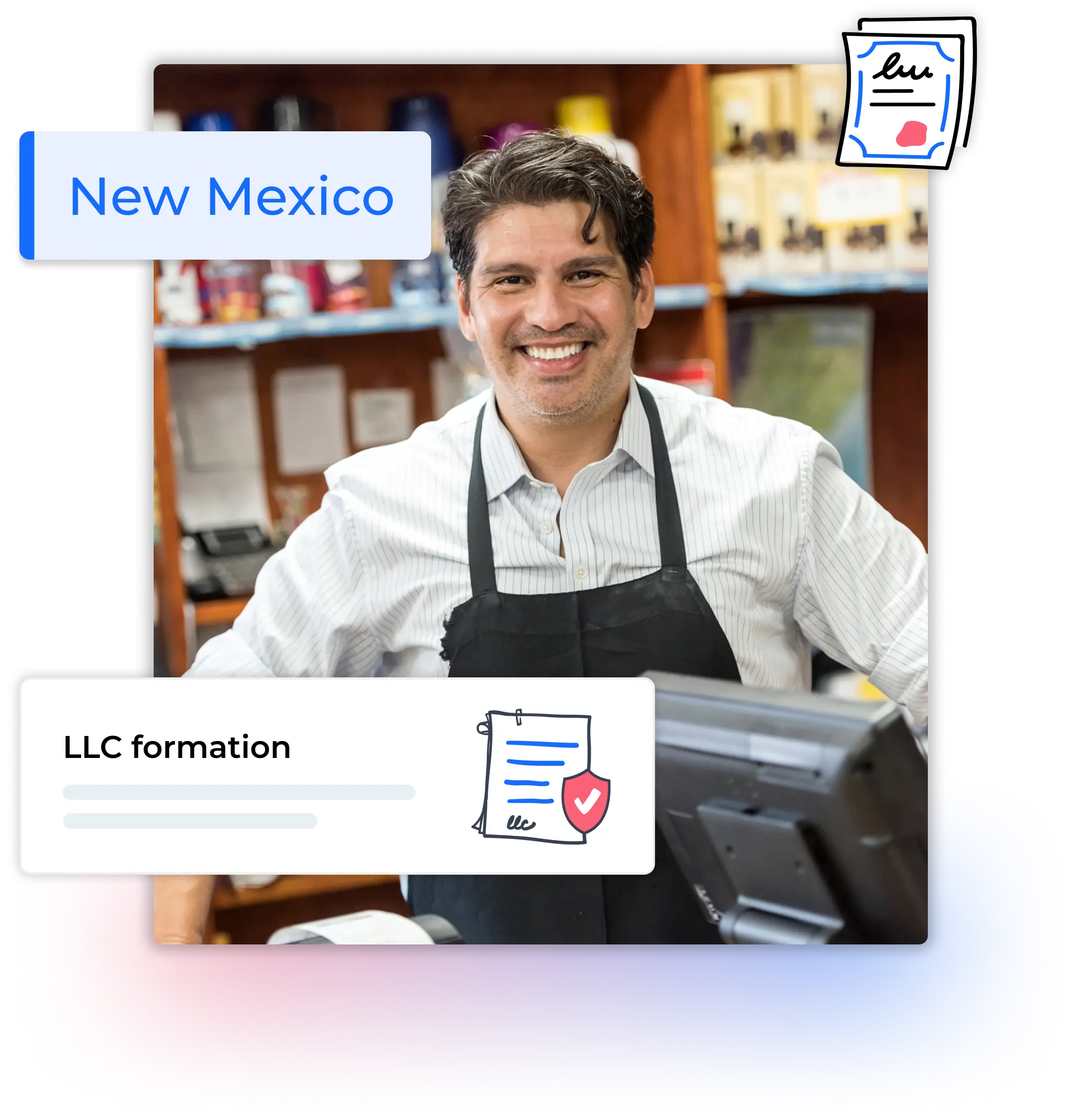Quick facts about forming a New Mexico LLC
| Filing Fee | $50 (online only) + $1.95 processing fee |
| Processing Time | 1-3 business days |
| Annual Report Fee | None |
| Registered Agent Required | Yes, must have a physical New Mexico address |
| State Franchise Tax | None for LLCs |
| Business License | No statewide business license, but local permits may be required |
| Managing Authority | New Mexico Secretary of State, Business Services Division |
How to start an LLC in New Mexico in 5 steps
If you are thinking about starting a business in New Mexico, organizing it as a limited liability company (LLC) offers many benefits. Forming an LLC may help to protect you from personal liability for business debts. If, for example, the business owes someone money, they will most likely not be able to come after you to collect the debt.
The names of an LLC’s owners, known as “members,” are not part of the public record in New Mexico, which effectively makes ownership of an LLC anonymous. The New Mexico LLC formation cost is much lower than in many other states.
Here are the six steps you will need to complete in order to form an LLC in New Mexico:
- Name your New Mexico LLC
- Choose your registered agent
- File articles of organization
- Create an operating agreement
- Apply for an EIN
Below, you’ll find a detailed explanation and also a helpful video to walk you through each step.
Step 1: Name your New Mexico LLC
New Mexico law sets several specific requirements for the name of an LLC. The name must be distinct from the name of:
- Any existing corporation, LLC, or limited partnership that has already been formed in New Mexico
- Any foreign corporation or LLC registered with the New Mexico Secretary of State (SOS)
- Any business name that has been reserved with the SOS
in order to check if desired your name has not been used, you need to run a New Mexico Secretary of State business search in the state’s database.
The business name must include one of the following:
- Limited liability company
- Ltd. liability company
- Limited liability co.
- Ltd. liability co.
- Limited company
- Limited co.
- Ltd. co.
- L.L.C.
- LLC
- L.C.
- LC
Step 2: Choose a registered agent
Every business entity registered in New Mexico must designate an individual or business to serve as the company’s registered agent. They must have a street address, not a P.O. Box, in the state where someone is available during business hours to receive paperwork on behalf of the LLC. A New Mexico registered agent must be either:
- An individual who resides in New Mexico; or
- A corporation, LLC, or partnership that is registered with the SOS as a domestic or foreign business entity
The state will send important notifications to the registered agent. If someone files a lawsuit against the LLC in a New Mexico court, the process server will deliver the paperwork to the registered agent.
You may serve as the registered agent for your LLC and use the LLC’s principal business location as the registered office. If you do so, however, you give up the anonymity that comes with creating an LLC in New Mexico. As a member of an LLC, your name and address are not part of the public record. Information about registered agents, however, is available to the public.
Third-party businesses offer registered agent services to LLCs and other businesses registered in New Mexico. Some lawyers or law firms may act as registered agent for their business clients. You may also use a registered agent service, which will act as your registered agent and use its office location as your registered address in exchange for an annual fee. The benefits of this include preserving the anonymity of your LLC’s members and reducing the amount of paperwork that comes to your business address.
You can designate a registered agent when you file the articles of organization. The registered agent must give consent by signing a Statement of Acceptance of Appointment by Designated Initial Registered Agent. You can change the registered agent or registered office by notifying the SOS.
Step 3: File articles of organization
Once you’ve found a name for your business, you should be ready to file the articles of organization. This document officially creates your LLC as a distinct legal entity.
State fees
The SOS charges a $50 fee to file the articles of organization and a $1.95 processing fee, so you will be charged a total of $51.95.
Requirements
The person who files the articles of organization is known as the “organizer.” You can be the organizer of your own LLC, or you can have an LLC formation service do it for you.
You must make several decisions about your business before you can complete the articles of organization. First, you must decide if you want to establish a specific duration for the LLC. Most LLCs have perpetual duration, meaning that they will continue to exist until the members decide to dissolve them. You could, instead, state that the LLC will have a finite life span, such as 20 years.
Next, you must decide how you want to handle the management of the LLC. The members of an LLC are typically in charge of running the business, but they could choose to turn that role over to managers. The relationship between members and managers in an LLC is somewhat similar to shareholders and directors in a corporation. If you will be the only member, or the business will only have a few members, you might not need to have managers run the business.
You will need to provide the following information for the articles of organization:
- The LLC name
- The name of the registered agent
- The street address of the registered office
- The street address of the LLC’s principal place of business, if it is different from the registered office
- The duration of the business, if not perpetual
- The purpose of the business
- Whether the members or managers will manage the business
You must also submit a Statement of Acceptance of Appointment by Designated Initial Registered Agent signed by the registered agent.
How to file
The only way to file articles of organization is online through the NM SOS online filing portal or using an LLC registration service. You can fill in all of the required information, upload documents like the registered agent acceptance statement, pay the filing fee with a credit card, and receive confirmation all at once.
Step 4: Create an operating agreement
New Mexico law defines an operating agreement as “a written agreement providing for the conduct of the business and affairs of a limited liability company.” It establishes important issues like how members or managers make decisions for the company, how members may receive their shares of business profits, and how to resolve disputes between members or managers. Operating agreements are particularly helpful for LLCs with multiple members, but even single-member LLCs can benefit from having a written set of rules and guidelines for running the company.
A New Mexico operating agreement is not a legal requirement in the state the way that designating a registered agent is required. That said, having one is a very good idea for most LLCs. An operating agreement can set clear expectations for the LLCs members. It can memorialize the members’ intentions regarding issues like the apportionment of profits and losses, and help you avoid disputes further down the road. It can also help preserve the members’ liability protections by setting clear boundaries for actions taken on behalf of the company.
Step 5: Apply for an EIN
Next, you will need to obtain an Employer Identification Number (EIN) from the IRS. This number serves a similar purpose as a Social Security Number. They have the same number of digits, although they are formatted differently. A Social Security number is written xxx-xx-xxxx, while an EIN is written xx-xxxxxxx.
You will need an EIN for your LLC for multiple purposes, including:
- Opening a business bank account
- Paying federal taxes
- Hiring and paying employees
- Applying for business loans
- Issuing 1099s to freelancers and other independent contractors
- Establishing your business’s credibility for vendors and customers
If you are located in New Mexico, or anywhere else in the U.S., you can obtain an EIN online, by fax, or by mail. Outside of the U.S., you may be able to apply for an EIN by telephone.
Applying for an EIN online is the fastest method. You should be able to obtain a number right without having to wait. Applying by fax or mail means waiting days or weeks to get your EIN.
Regardless of the method you use to apply for an EIN, you should fill out Form SS-4. The first section of the form asks for the company’s name and contact information, as well as your name as the “responsible party.” Lines 8a-8c ask for information about the LLC. Line 10 asks the reason why you are applying for an EIN. You may choose “Started new business.” You could choose “Hired employees” or “Banking purpose” instead if you think that is more appropriate.
The IRS does not charge a fee to obtain an EIN. To apply by mail, send the completed SS-4 to the Internal Revenue Service, Attn: EIN Operation, Cincinnati, Ohio 45999. You can fax the form to (855) 641-6935.
FAQ
It costs $50 to file your Articles of Organization online with the New Mexico Secretary of State plus a $1.95 processing fee.
Most filings are processed within one to three business days.
Yes, every LLC must have a registered agent with a physical address in New Mexico.
New Mexico does not require an operating agreement, but creating one is recommended to outline your ownership and management structure.
No, New Mexico does not require annual or biennial reports for LLCs.
New Mexico does not charge a franchise tax for LLCs, though members may owe state income tax on business profits.
New Mexico does not require a statewide business license, but local cities and counties may require additional permits or registrations.
Yes, nonresidents can form a New Mexico LLC as long as they appoint a registered agent with a New Mexico street address.




